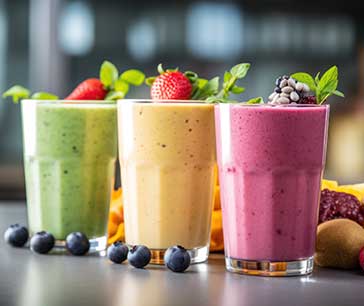Table Of Contents
- Alternatives to Meat and Dairy Products: Increasing Focus on Environmental Sustainability
- Functional Foods and Beverages: Pushing for a Healthy Lifestyle
- Growing Spice Tolerance: Globalization of Cuisines and Recipes
- Personalized Nutrition: Rising Emphasis on Immunity Building
- Upcycled and Sustainable Ingredients: Holistic Approach towards Well-being
- The Dawn of a New-Era for the Food & Beverages Industry

Roshan Deshmukh

Pooja Parvatkar
Top 5 Food & Beverages Trends for Q1 2024: Embracing the Changes in the Industry

Just like most other sectors of the global economy, the food & beverages sector, too, is witnessing massive shifts in its outlook. One of the key drivers of this shift is the increasing focus on environmental sustainability and rising demand for food products that have little effect on carbon emissions. The advent of different cuisines and recipes has also played an important role in shaping the contours of this industry. Allied Market Research has analyzed the 5 major trends in the food and beverages sector that will have a significant impact on this industry. These trends, as per the analysis, are expected to change the face of the industry in the coming period.
Alternatives to Meat and Dairy Products: Increasing Focus on Environmental Sustainability
A transformational shift in the food & beverages industry is being driven by the vegan “revolution”. A key aspect of this change is the increasing expanse of the plant-based meat market. The meat industry, being one of the major contributors to greenhouse gas emissions, has been at the center of criticism from environmentalists and animal rights activists. As a result, many companies such as Amy’s Kitchen, Beyond Meat, Impossible Food Inc., in the food & beverages industry have pivoted to plant-based food items. Not just meat, even milk and dairy products are being replaced by food items which have plant origin. The plant-based milk market, due to this shift, is anticipated to gather $7.3 billion by 2032. Thus, concerns related to global warming and climate change have affected the food & beverages industry also.
Functional Foods and Beverages: Pushing for a Healthy Lifestyle
Increasing emphasis on physical and mental health has escalated the demand for functional foods and beverages. The demographic tilt in favor of youth across the globe has a huge role to play in the growth of the functional food market. People from age group 18-40 have started consuming functional foods and beverages to improve cognitive functioning and adapt to the hormonal changes in a better way. Also, vitamin and mineral deficiencies in the body, if any, are effectively addressed by these functional beverages. The shift has been so apparent that even for quenching thirst, many prefer functional water instead of normal water. Another important aspect of this is the growing dependence on herbal nutraceuticals, thus moving away from allopathic medicine. The global herbal nutraceuticals market has witnessed a huge surge owing to this trend. Endorsement of functional foods and beverages by sportspeople and celebrities has acted as a catalyst for this change.

Growing Spice Tolerance: Globalization of Cuisines and Recipes
An interesting outcome of globalization and the opening of economies has been the rising exchange of cultural practices and food habits. Certain sauces, oils, and spices have gained massive popularity across the globe and have received international acclaim. Cuisines from Asia and Carribean which are known for their hot and spicy flavors are becoming mainstream in Europe and North America. Similarly, American and European fast-food chains have opened in almost all major cities and urban areas of Asia-Pacific and Latin American countries. Culinary herbs and hot spices are gradually becoming the main ingredients for preparing daily meals. The rising spice tolerance is, thus, a major driving factor of the shift in the food & beverages industry.

Personalized Nutrition: Rising Emphasis on Immunity Building
One major characteristic feature of the pandemic and post-pandemic era has been the rise in awareness regarding the importance of immunity and healthy lifestyle. People across the world have consciously made changes to their diet and have laid stress on consumption of nutritious foods and beverages. Moreover, people have set their health goals and have opted for personalized nutrition as a means to achieve them. As a result, food products such as ready-to-mix powders, protein shakes, creatine-enriched foods, etc., have become highly popular. Also, personalized supplements and energy bars have helped the personalized nutrition market gain prominence.

Upcycled and Sustainable Ingredients: Holistic Approach towards Well-being
As part of environmental sustainability, consumers and companies, both, are shifting towards upcycled ingredients such as fruit pulps and brewing grains for production of various food items. The basic idea behind this is to minimize food wastage and to repurpose by-products and waste items as ingredients for preparing different dishes. Various companies in the food & beverages industry have opted for this model of circular economy and launched their own products. In fact, owing to such measures, the upcycled food products market is expected to reach $97 billion by 2031.
The Dawn of a New-Era for the Food & Beverages Industry
As identified by Allied Market Research, five trends are expected to change the industry's dynamics soon. The growing focus on environmental sustainability, rising demand for functional foods, increasing spice tolerance, adoption of personalized nutrition, and push for upcycled foods are these five major trends which will shape the industry in Q1 2024. Companies and businesses that realign with these trends are sure to take a lead over their peers and establish their dominance in the industry. For more insights on how businesses can capitalize on the opportunities offered by the food & beverages industry,

